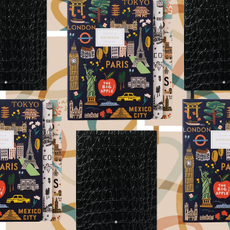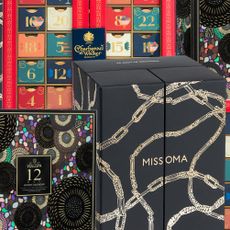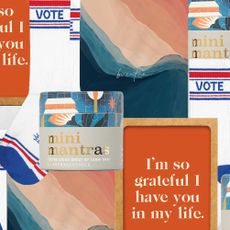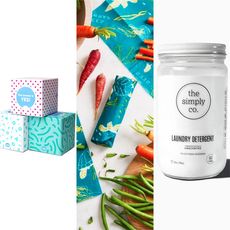We are living the time of the Great Purge. If an SUV, a McMansion and a 90-inch flat screen TV was the American Dream of the last century, this century's fantasy of aspirational wealth is much more likely to fit tidily into a studio apartment. Our Pinterest-curated dreamscapes are awash with capsule closets, tiny houses, and clean, white Scandinavian design. The less you own, it seems, the more likely it is that you have "made it."
And so, late one Monday night, I found myself tearing through my apartment, mumbling ferociously about Sparking Joy. That all of your earthly possessions should inspire in you a chorus of jubilation is, of course, the central tenet of Japanese tidiness guru Marie Kondo's must-have guide to modern minimalism, The Life-Changing Magic of Tidying Up, which I had just finished reading.
"Keep only those things that speak to your heart," Kondo writes, as if cooing encouragingly from the page. This philosophy made total sense: Why bother hanging onto anything in life that doesn't make you totally stoked?
"This philosophy made total sense: Why bother hanging onto anything in life that doesn't make you totally stoked?"
"Only when you know how to choose those things that spark joy can you attain your ideal lifestyle," she writes in the sequel, Spark Joy, which of course I read, too.
Using the patented KonMari method, I wagered, I could purge my way through my apartment and achieve a higher state of being in just a few hours.
I opened my kitchen utensil drawer and examined with rigor each item—the spatula's color, the contours of a whisk—and dug deep into my soul to inquire whether it had evoked some kind of rapture within.
"My criterion for deciding to keep an item is that we should feel the thrill of joy when we touch it," Kondo advises.
Stay In The Know
Marie Claire email subscribers get intel on fashion and beauty trends, hot-off-the-press celebrity news, and more. Sign up here.
I clutched an egg beater in my hand and waited, impatiently, for some kind of jolt from above informing me that this egg beater and I were meant to be. Instead, I just became irrevocably annoyed by the dings on its plastic handle and the bits of rust that had begun to accumulate in its gears.
"I wagered I could purge my way through my apartment and achieve a higher state of being in just a few hours."
"Tidying is a dialogue with one's self," Kondo writes.
My inner dialogue felt that maybe there was an egg beater out there in a less putrid shade of green. The egg beater was out.
With the guidance of Kondo's instructions, I laid the entire contents of my closet on my living room floor, and ruthlessly chopped its number of items in half. That plain white t-shirt? It provided no thrill. My black flats? Practical, but uninspiring. Black jeans? No joy whatsoever.
My collection of ugly startup t-shirts that I wore to the gym got the boot, because while it might seem like "a waste to get rid of something that is still perfectly usable," the things "we can't bring ourselves to discard even when they don't inspire joy are a real problem." Surely there were more joyful gym clothes.
My stock of books was minimized, old photos I suspected I would never look at again were thrown out. Even my apartment greenery did not survive the culling. One look at that struggling Fatshedera lizei on my book case and I knew it was a goner. Happiness, I could hear Kondo whispering in my head, is only attained when you are surrounded by the things you love. And how could I love this plant, which had never quite adjusted to life indoors and was plagued by sparse foliage? The plant, I concluded, was unacceptably unattractive. Trash!
Looking around at my apartment's newly spare aesthetic, I was overwhelmed by the sense of calm. "When you put your house in order, you put your affairs and your life in order, too," Kondo promised. Suddenly, my entire life was back on track. I was officially a #konvert.
Then the next morning, I woke up to realize it was a little more like I had gone #kondocrazy.
I wanted to make scrambled eggs, but had, of course, discarded my egg beater (sure it wasn't pretty, but it did make those eggs light and fluffy). When I went to get dressed, I found that in my newly trim wardrobe there was nothing that matched the floral pants I'd selected, since I'd thrown out my only white shirt. By the end of the week, I'd run out of gym clothes because the ones I purged had been deemed too ugly. And that plant? I missed it—it was a gift from my mother, a rare intergeneric hybrid that I had treasured.
"When we really delve into the reasons for why we can't let something go, there are only two: attachment to the past, or fear of the future," Kondo writes.
"My stock of books was minimized, old photos I suspected I would never look at again were thrown out. Even my apartment greenery did not survive the culling."
Sometimes, though, we also hold onto things because they are practical or necessary.
If you don't have to worry about money, it's easy to imagine swapping out your mismatched tupperware for some fancy, matching French jars, or trading your old coat in for a new one each season to keep your wardrobe fresh and at exactly 27 items.
As Tracy Moore wrote in Jezebel, "If minimalism is a kind of voluntary thing-poverty, then real poverty is involuntary minimalism."
Editing your lifestyle may be, as Kondo writes, "essential to create a quiet space in which to evaluate the things in your life." It is also a glaring symbol of wealth. To purge is privilege.
Kondo did have some good advice—my dresser drawers have never been so successfully organized, and she's right, in the end, I was probably never going to re-read most of those books that are now gone from my shelf.
But also apparent was the inherent silliness of throwing out an egg beater that makes perfectly good eggs because it's not quite a joy-sparking color, or a white t-shirt that delivers little more than function. Sure, I could replace them with items that bring me more pleasure. Or I could use that money to pay off my student loans and enjoy some fine scrambled eggs.
"To purge is privilege."
In the end, it turns out, you can't actually reach nirvana by throwing out your stuff. And in the time of the Great Purge, holding on to our clutter has become not just necessity, but a form of dissent—and I'm on board.
Follow Marie Claire on Facebook for the latest celeb news, beauty tips, fascinating reads, livestream video, and more.
-
 Don't Be Scared to Get a Rook Piercing
Don't Be Scared to Get a Rook PiercingHere's everything you need to know.
By Gabrielle Ulubay Published
-
 Preventative Haircare Is Trending—This Is What You Should Use
Preventative Haircare Is Trending—This Is What You Should UseSponsor Content Created With KilgourMD
By Emma Walsh Published
-
 Charithra Chandran Wants You to Take Yourself on a Date
Charithra Chandran Wants You to Take Yourself on a DateThe "Bridgerton" star is ditching the dating apps.
By Gabrielle Ulubay Published
-
 The 16 Best Inflatable Pools for Your Hot Girl Summer
The 16 Best Inflatable Pools for Your Hot Girl SummerThis Barbie beats the heat in style.
By Julia Marzovilla Last updated
-
 21 Cute Notebooks for To-Do Lists and Journaling
21 Cute Notebooks for To-Do Lists and JournalingDitch the Notes app for now.
By Rachel Epstein Published
-
 Chic Puzzles for Adults That Will Help Ease Your Mind for a Bit
Chic Puzzles for Adults That Will Help Ease Your Mind for a BitSo cute you'll want to frame 'em.
By Rachel Epstein Published
-
 13 Luxury Advent Calendars to Get You in the Holiday Spirit
13 Luxury Advent Calendars to Get You in the Holiday Spirit24 days of truffles? Say less.
By Rachel Epstein Last updated
-
 Gifts Under $20 That Are Meaningful and Affordable
Gifts Under $20 That Are Meaningful and AffordableFrom artwork to books to donations on their behalf.
By Rachel Epstein Published
-
 Emma Roberts on the Freedom of Plastic-Free Living: "It Just Feels Good"
Emma Roberts on the Freedom of Plastic-Free Living: "It Just Feels Good"The actress challenged herself to not use plastics for a week in partnership with Grove Collaborative.
By Julia Gall Published
-
 16 Sustainable Product Swaps to Make Your Home More Green (And More Chic)
16 Sustainable Product Swaps to Make Your Home More Green (And More Chic)You aren't trashy, so don't let your household be.
By Julia Gall Published
-
 Power Pick: Samsung's The Frame TV Is an Actual Masterpiece
Power Pick: Samsung's The Frame TV Is an Actual MasterpieceBring the Louvre to your living room.
By Sally Holmes Last updated